The 45km road to Ushguli was said to be treacherous: a precarious dirt track requiring a 4×4 and at least 3 hours. Small jacked-up Mitsubishi Delica vans make the trip many times each day in the August high season, and so we walked to the centre of town in the morning to buy a ticket.
To my surprise, we were pointed to a regular-sized marshrutka van, the typical fixed-route transportation for short to moderate distances in Georgia. We would have it entirely to ourselves.
We also discovered that more than half the road had been paved. Not especially well-paved, given what winters here do to tarmac. But only the final stretch was deeply rutted, and no worse than the tracks I’d used in Mongolia. The drive took an hour and twenty minutes, half what we were expecting.

The village sits in a shallow, treeless valley 2,150m above sea level, hemmed in by mountains and bisected by the Inguri River whose waters are clouded with glacial flour. The roofs of stone houses are laid with slabs of ragged black slate, and the towers seem to rise from the earth in a blend of lichen and damp that mirrors the cloud-scudded sky.
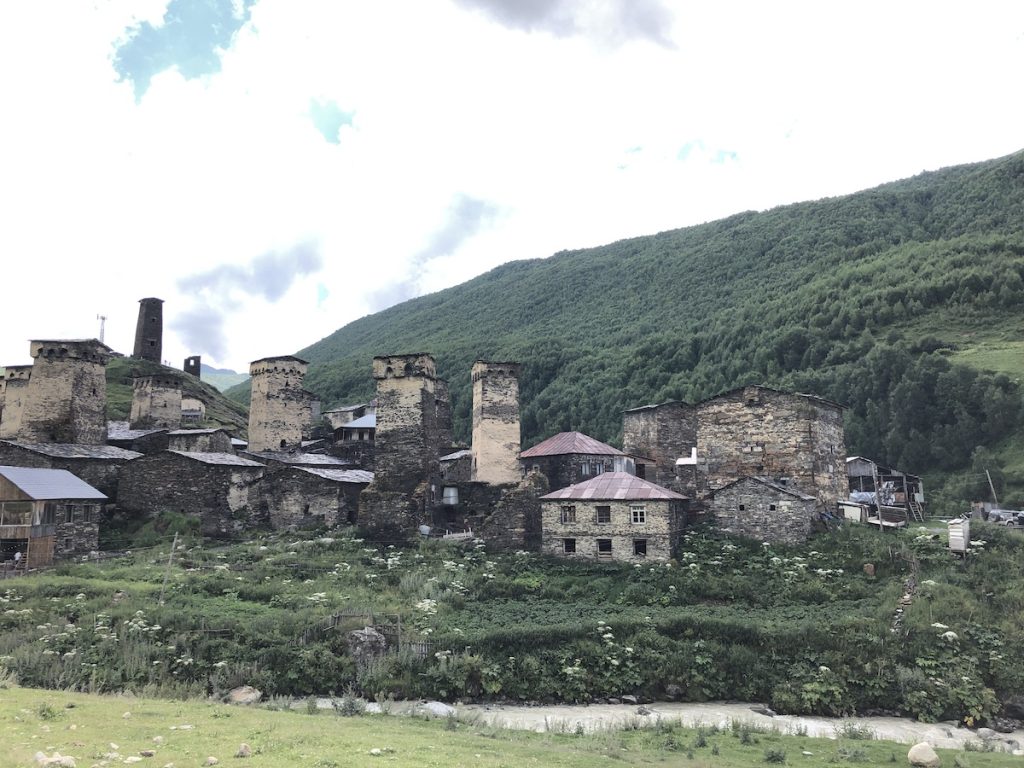
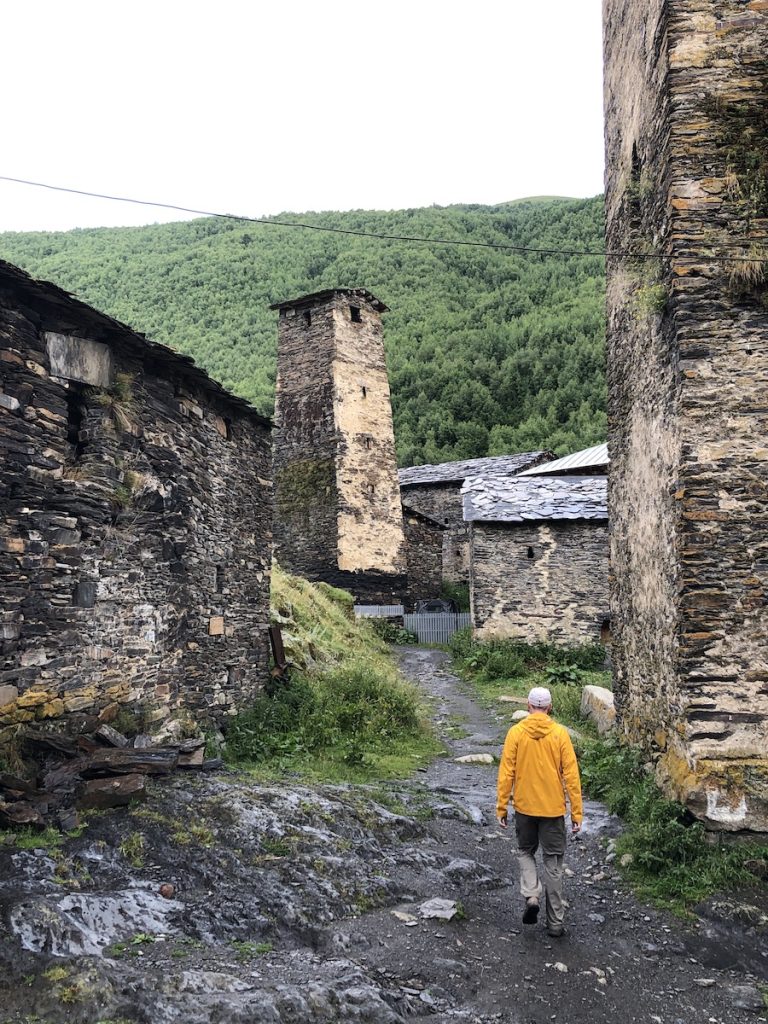
We checked in to our guesthouse — an old stone place surrounded by the slender silhouettes of Svan towers in varying states of repair — and set out to walk through what is surely one of the most beautiful villages in the Caucasus.
And it is very much a medieval village, with stone dwellings, narrow mud-filled lanes, and the smell of animals and animal droppings everywhere.
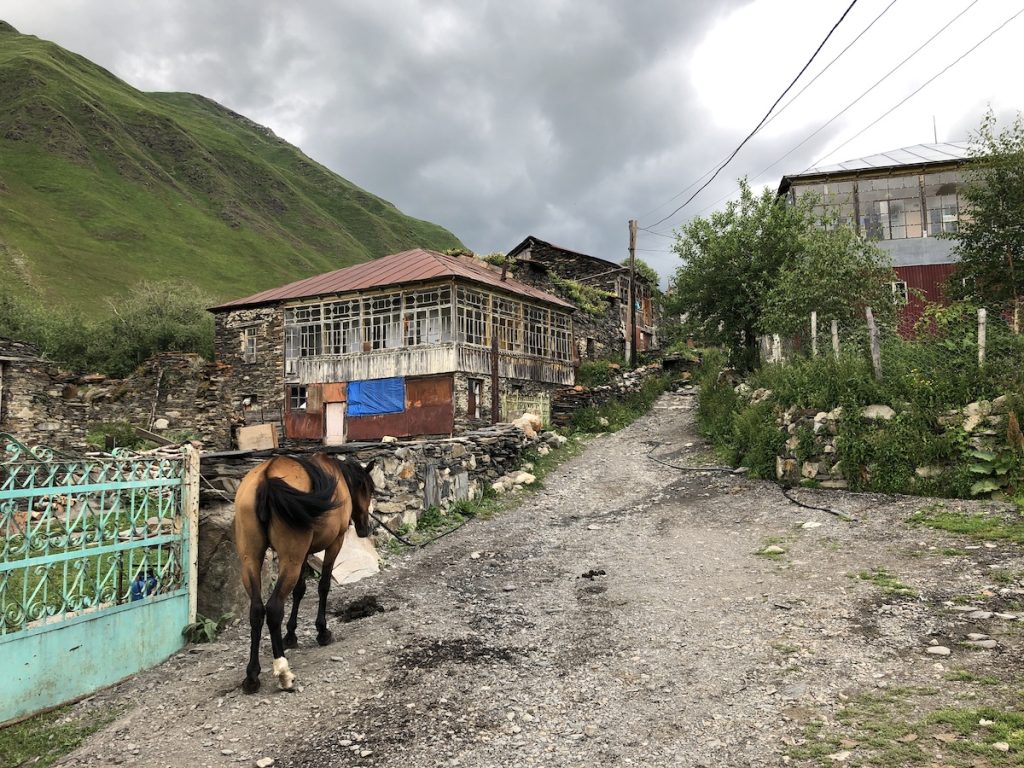

It only took half an hour to shuffle down every path. We spotted a small museum of ethnography and went inside. The gloomy stone structure had been a traditional family home for generations. Large animals lived in pens beneath sleeping platforms, where their warmth would rise to heat the three generations of people who huddled there.
A fire burned in the centre, but there was no outlet for the smoke that coated the walls with accretions of soot. Nearby, a carved wooden chair was reserved for the head of the family, the oldest male. The descendant who showed us around the home said their tower was destroyed long ago, along with so many in this village, when the Soviet Red Army invaded in 1921.
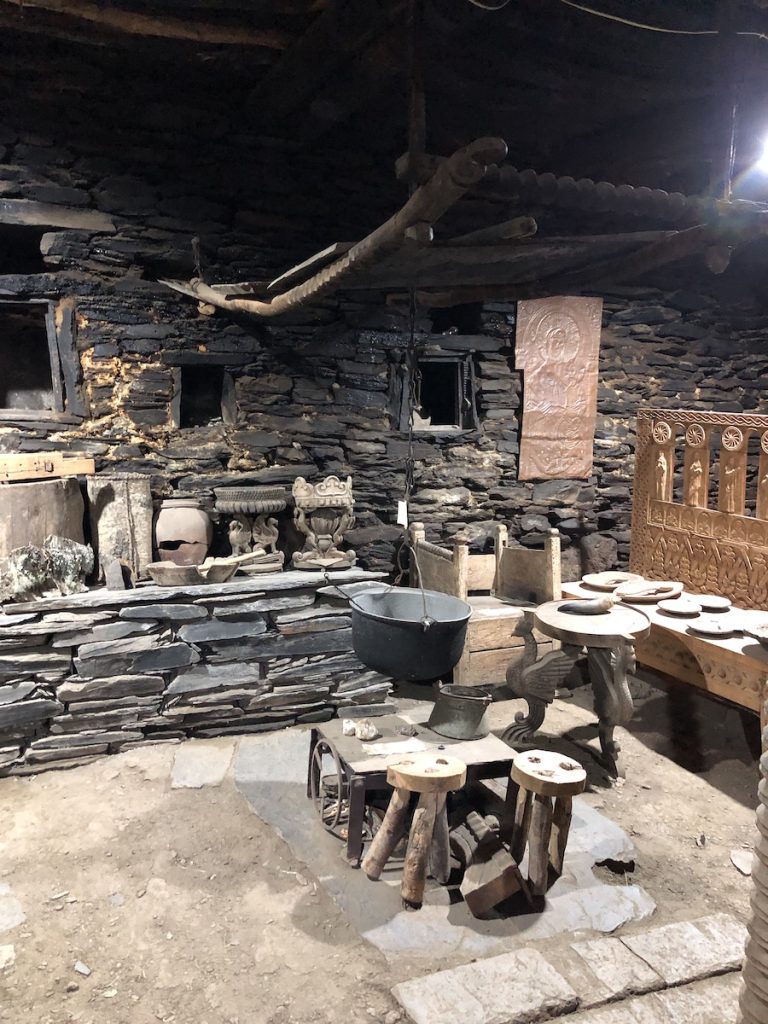
We stepped back into a sunny afternoon which was quickly becoming overcast, and walked back down the main track, stopping for a bottle of beer at a yard which didn’t have any tourists. The vast majority of people who come to see the UNESCO-listed village do so on day trips from Mestia, and they would soon be gone. Few stay for two nights, like we were.
The skies split open as we sipped our beer, trapping us beneath the umbrella. Three middle-aged guys took shelter at the neighbouring table, armed with a plastic bowl of cucumbers and tomatoes, cheese bread and a big plastic water cooler jug full of homemade wine. The lady at the Kafe Open brought them grilled meat, and the toasting began. Each time a glass of wine was raised, the entire glass had to be drained. These speeches grew increasingly elaborate as the men’s eyes grew increasingly narrow and we were soon drawn into the fray, with no common language but gestures and a shared thirst.

The entire session couldn’t have lasted more than an hour. When the rain finally sputtered out, so did they, but not before tearing off a big hunk of cheese bread for us, and passing me a cucumber snapped in half.
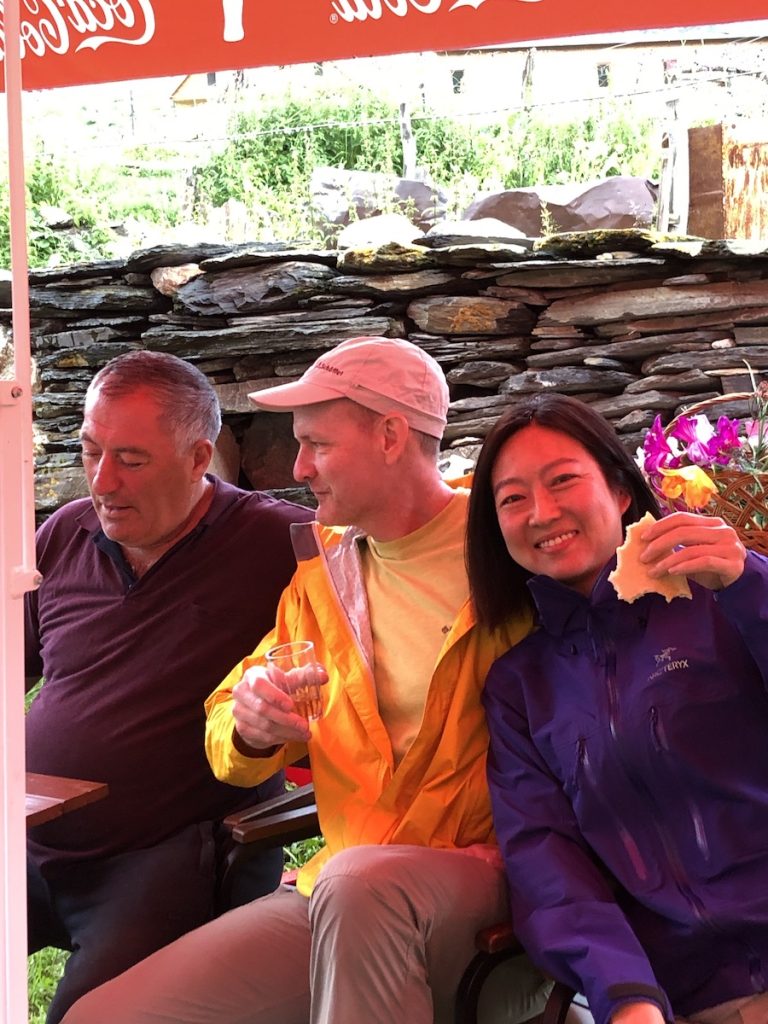
If you’d like to know more about this village and how people used to live there, check out a film called Dede. It’s shown in both Ushguli and Mestia (where you’ll be sold a ticket by one of the film’s stars).

As for me, I crawled into my far-too-short guesthouse bed far too early so I could beat the worst of the heat on an early morning hike to the Gorvashi Pass.
I followed a trail that led directly from the edge of Chazhashi, the Ushguli community where we were staying. The route would cross the Latpari Pass before descending to the village of Chvelpi, but I wasn’t planning to walk that far.
A steep climb through low scrub opened onto massive fields of rhododendron whose tangled roots were still slippery with morning dew. Apart from one section that traversed a slope more or less on the level, it was a relentless uphill grind.
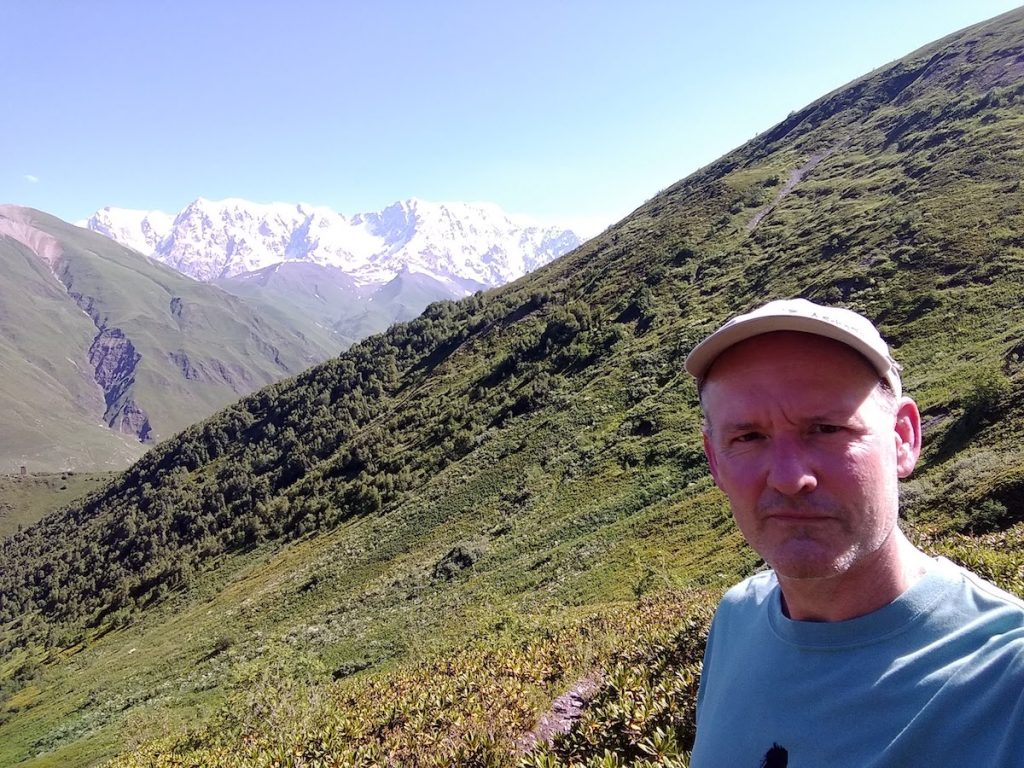
I reached the Gorvashi Pass (2,972m) in 2.5 hours and sat down to eat my lunch. The Greater Caucasus range had revealed itself peak by peak as I climbed, and now there it was spread out before me: snow-clad Shkhara towering over Ushguli, the cone of Tetnuldi, the sheer rock face of Ushba over by Mestia, and in the far distance, the snowy bulk of Elbrus, Europe’s highest peak, beyond the Russian border.


Only one point on the trail was higher, but only by 3m. Rather than press on for the sake of pressing on, I decided to sit there and enjoy one of the best views in the entire Caucasus.
The going was good — and much drier — on the way down. I made the descent in just under 2 hours, passing two separate couples who were on their way up. They were the only hikers I’d seen all day, despite the plethora of Gore-tex and boots shuffling around Ushguli by way of the usual 4-day route.
When Tomoko returned from a walk of her own, I closed my notebook and we made our way back to the Kafe Open, where we’d been caught in a drinking session the evening before. The family was happy to see us return, the food was excellent, and the homemade wine flowed freely as the elderly grandmother shuffled around the yard picking weeds. I noticed her grasping chairs as she crossed the lawn behind the tables, and I jumped up to fetch her cane. Her face had lit up in the kindest smile.
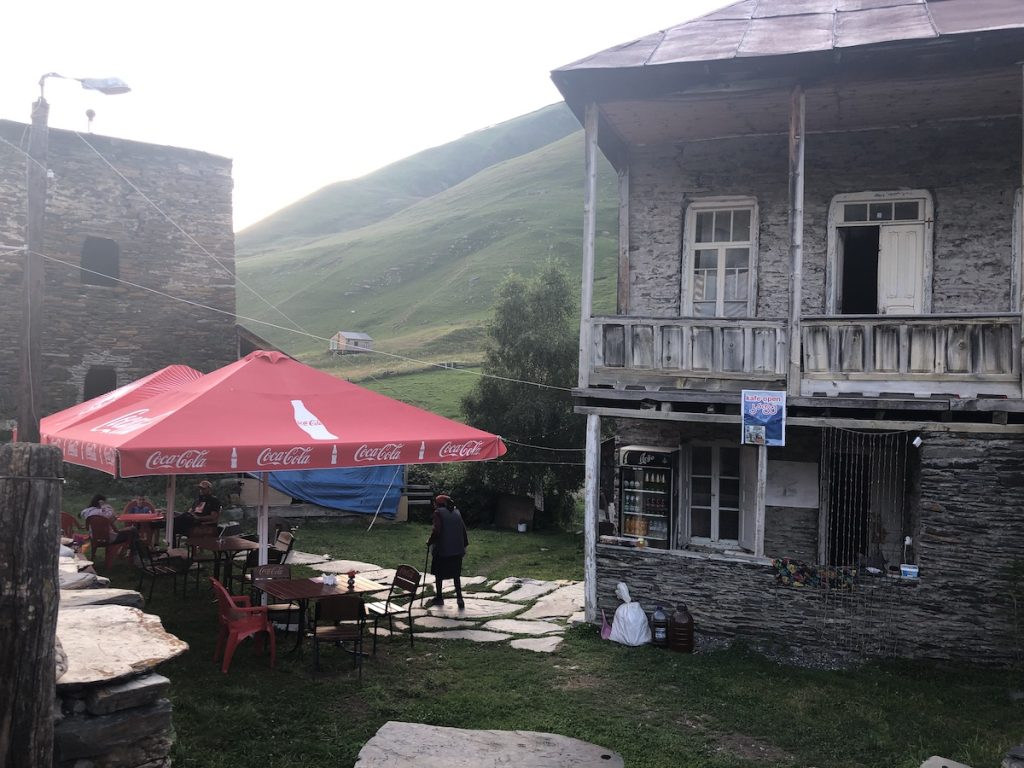
The son of the house offered me another glass of wine before we left, and came over to talk about horses. When we finally stood to wander into the night, the grandmother took me aside and made a very long, very sincere speech that sounded like some sort of blessing.
Photos © Tomoko Goto 2023
